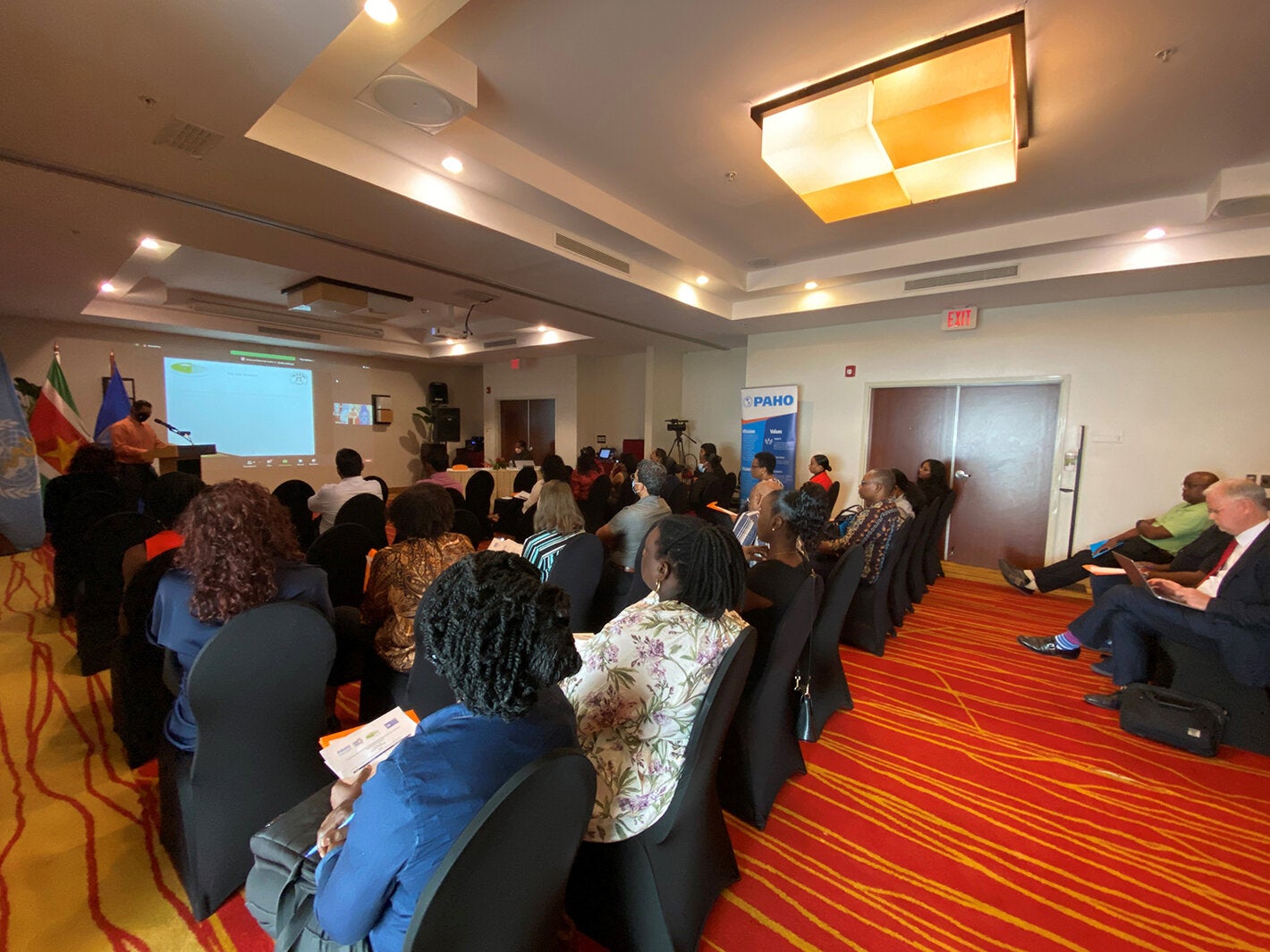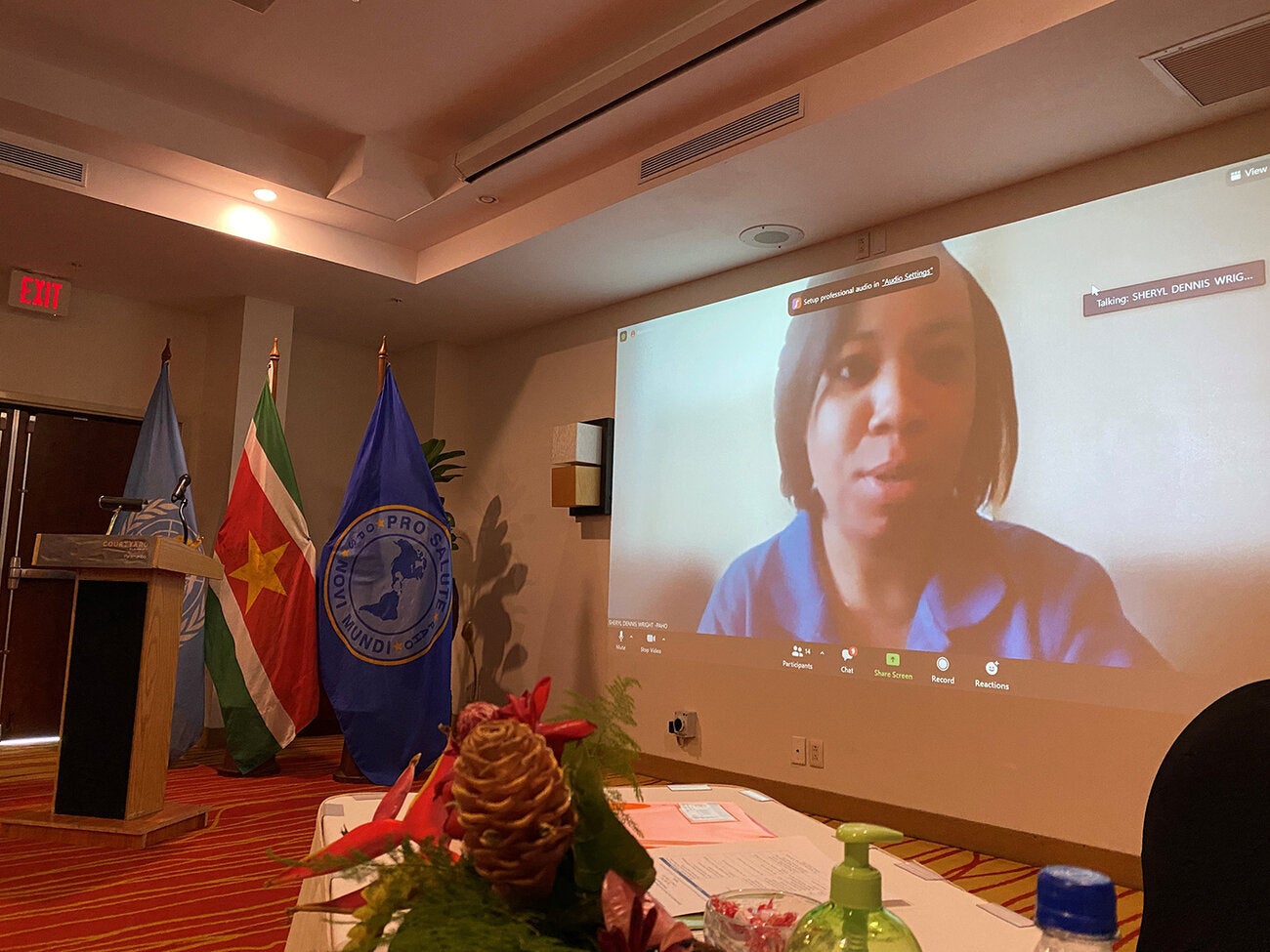
Suriname can save more than 3,500 lives, SRD 2.0 billion (US$ 268 million) in social and economic losses, and SRD 121 million (US$ 16.2 million)* in healthcare expenditures over the next 15 years by implementing a set of policy measures to address physical inactivity and reduce consumption of tobacco, alcohol, and salt; and by scaling up health services for cardiovascular disease, diabetes, depression, alcohol dependence and psychoses.
11 July 2022 - These are the results of a study presented today, entitled "The investment Case for the Prevention and Control of Noncommunicable diseases and Mental Disorders in Suriname". The study was carried out by the Pan American Health Organization (PAHO) and the United Nations Development Programme (UNDP), in collaboration with the Ministry of Health of Suriname and supported by RTI international. It took place within the “Health System Strengthening for Universal Health Coverage Partnership” project, funded by the European Union.
“The results from this study demonstrate that there is a strong evidence-base for investing in preventive and control measures that reduce the health and economic burden of NCDs and mental disorders, and improve access to care.” said Suriname’s Director of Health, Dr. Rakesh Gajadhar Sukul.
The study analyzes three groups of interventions:
-
Policies to reduce physical inactivity, and tobacco, alcohol, and salt consumption
-
Clinical interventions to control cardiovascular disease and diabetes; and
-
Scaled-up treatment of mental disorders, in particular depression, alcohol dependence, and psychotic conditions. It shows that for every Surinamese dollar (SRD) invested in the implementation of this package of measures, Suriname would receive a return on investment (ROI) of 2.6 SRD in social and economic benefits*, over a period of 15 years. Increased productivity from improved health and well-being would help grow the economy by an extra one-third of a percentage point over 15 years. The ROI for each package of interventions was also calculated. The study found that for every SRD invested in policies aimed at reducing tobacco use, Suriname would receive a return of 10.3 SRDs. ROIs for population-level policy measures to reduce salt intake and alcohol use, and boost physical activity, are 3.7, 2.4, and 1.9 respectively. And ROIs for clinical interventions to prevent or treat depression, CVD, alcohol dependence, psychosis, and diabetes are 4.6, 2.2., 1.7, 1.1 and 0.96 respectively.
“The Ministry of Health has embraced the results of this study and the importance of investing in interventions for the prevention and control of NCDs and mental health disorders as an important contributor to the overall health and development of the country. Such investments will help to reduce premature deaths and improve productivity. PAHO/WHO remains committed to working with the Ministry of Health and other sectors to translate the findings of this study into concrete actions towards achieving SDG3 and other sustainable development goals” said Karen Lewis-Bell, PAHO/WHO Representative in Suriname.
The report is the third of its kind conducted in the Region of the Americas, following Jamaica and Peru. It was carried out under the framework of the United Nations Inter-Agency Task Force on the Prevention and Control of Noncommunicable Diseases (UNIATF for NCDs) with the aim of advancing whole-of-government, whole-of-society efforts centered around the most cost-effective strategies for addressing NCDs and mental disorders in Suriname.
Addressing NCDs and mental disorders has emerged as central to the COVID-19 response and recovery, and to pandemic preparedness and response more broadly. Almost one-fourth of the global population has an underlying condition which increases vulnerability to poor COVID-19 outcomes, and most of these conditions are NCDs. The pandemic has also worsened mental health across the globe, including in the Region of the Americas, with prevalence of depression and anxiety increasing, for example. One of the most concerning aspects of the current pandemic has been that, just when NCD and mental health services are needed more than ever, they have faced severe pandemic-related disruptions.
“A defining aspect of the COVID-19 pandemic, in Suriname and across the globe, has been the role of NCDs in increasing deaths and socio-economic impacts, particularly in already disadvantaged communities. At the same time, COVID-19 has fueled a mental health crisis and disrupted essential services and support. To truly build forward better, achieve the SDGs, and leave no one behind, and to strengthen resilience to future crises, we must step-up investments for NCDs and mental health,” said Margaret Jones Williams, UNDP Deputy Resident Representative, Suriname.
The 2030 Agenda for Sustainable Development recognizes NCDs and mental disorders as a major challenge for sustainable development. Specifically, target 3.4 of the Sustainable Development Goals calls for a one-third reduction in premature mortality from NCDs by 2030 through prevention and treatment, and for the promotion of mental health and well-being. Currently, only a few countries in the Americas are on track to meet this global target; the NCD and mental health investment case provides a strong impetus for Suriname to progress forward.
*1 All values in 2019 currency units
*2 Package of measures - The total costs and total benefits presented for “all package of measures” are assumed to be additive. The investment case analysis does not consider synergetic effects of implementing all packages simultaneously.





